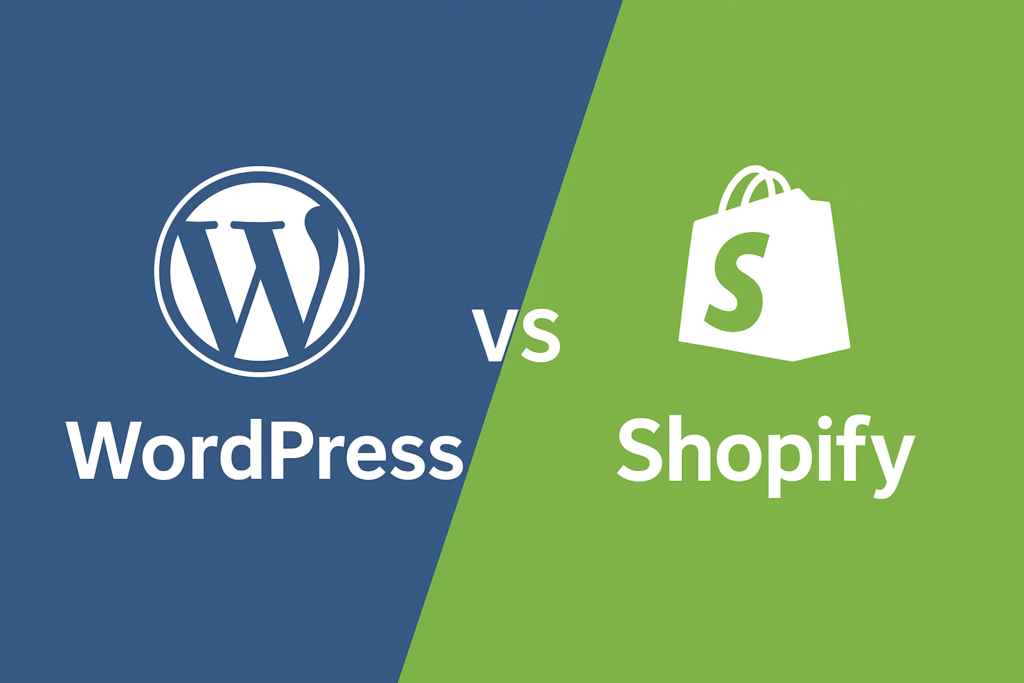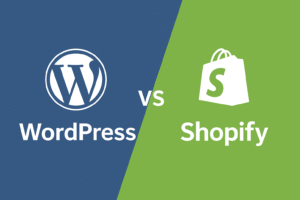
WordPress vs Shopify Which Is Better for Your Online Store?
If you’re planning to start an online business, one of the first big decisions you’ll face is choosing the right platform to build your store. Two of the most popular options are WordPress (with WooCommerce) and Shopify.
Both platforms allow you to create professional, functional, and attractive eCommerce websites — but they work in very different ways. Choosing between them depends on your goals, technical knowledge, and the type of business you want to run.

Let’s explore the key differences, pros, and cons to help you decide which one is the right fit for your online store.
1. Understanding the Basics
WordPress (with WooCommerce)
WordPress is an open-source content management system (CMS) that lets you build and customize any type of website. By adding the WooCommerce plugin, WordPress turns into a fully functional eCommerce platform.
It’s highly flexible and gives you complete control over your site design, features, and hosting. However, you’ll need to handle things like setup, security, and updates yourself (or with the help of a developer).
Shopify
Shopify, on the other hand, is a hosted eCommerce platform. This means it takes care of everything — hosting, security, updates, and performance — so you can focus on running your business.
You don’t need coding knowledge to use Shopify. It’s designed for simplicity, making it ideal for beginners who want to launch a store quickly and efficiently.
2. Ease of Use
When it comes to ease of use, Shopify wins.
It’s a plug-and-play solution — you sign up, choose a theme, add your products, and you’re ready to sell. The dashboard is user-friendly, and everything from inventory to payments is managed in one place.xuzpost.com
however, offers more freedom — but with freedom comes complexity. You’ll need to purchase hosting, install WordPress, choose a theme, and configure WooCommerce. It’s not difficult, but it does take more steps and a bit of technical confidence.
If you prefer a ready-to-use setup, Shopify is the better option. But if you enjoy customizing and fine-tuning your website, WordPress gives you more control.
3. Design and Customization
WordPress offers thousands of free and premium themes. You can tweak every element of your site using page builders like Elementor or Divi, and even hire developers to create a custom design.
Shopify also provides modern, mobile-friendly themes, but customization options are limited compared to WordPress. You can adjust layouts and colors, but deeper design changes often require Shopify’s coding language, Liquid.
If creativity and flexibility matter to you, WordPress is the clear winner. But if you prefer simplicity and consistency, Shopify will keep things streamlined.
4. Payment Options
Both platforms offer multiple payment gateways — including credit/debit cards, PayPal, and regional options.
Shopify has its own payment processor, Shopify Payments, which eliminates third-party fees (except credit card charges). If you use external gateways like PayPal, Shopify adds small transaction fees.
WordPress (WooCommerce) supports almost every payment provider available. You can integrate Stripe, Razorpay, PayPal, and many more without extra platform fees.
If you want more freedom and lower costs, WordPress with WooCommerce offers better flexibility in payments.
5. Pricing Comparison
Shopify Pricing:
Shopify offers subscription-based pricing:
-
Basic Shopify – around ₹2,000/month
-
Shopify – around ₹5,000/month
-
Advanced Shopify – around ₹20,000/month
The price includes hosting, SSL, security, and customer support. However, some premium themes and apps come with additional costs.
WordPress Pricing:
WordPress itself is free, but you’ll pay for:
-
Hosting: ₹200–₹700/month (depending on the provider)
-
Domain name: ₹800–₹1,000/year
-
Premium theme or plugins: optional
Overall, WordPress can be more affordable, especially if you choose budget hosting and free plugins. But Shopify provides more convenience at a slightly higher cost.
6. Apps and Plugins
WordPress has a massive library of over 50,000 plugins — both free and paid — covering everything from SEO and analytics to email marketing and design.
Shopify also has an app store with thousands of add-ons, but many of them come with monthly fees.
If you value flexibility and low-cost extensions, gives you more options. But Shopify apps are generally easier to install and maintain.
7. SEO and Marketing
WordPress is an SEO powerhouse. With plugins like Yoast SEO and Rank Math, you can optimize every page, product, and image to perform well on Google.
Shopify also has built-in SEO features, but they’re not as detailed. You can customize titles, meta descriptions, and URLs, but you have less control over advanced SEO elements.
For content-driven marketing — like blogging, inbound marketing, or organic SEO — WordPress is superior.
8. Security and Maintenance
Shopify takes care of all security aspects — from SSL certificates to server protection. You don’t have to worry about updates or data breaches.
WordPress, being self-hosted, requires you to manage updates, plugins, and backups yourself. You can use tools like Jetpack, UpdraftPlus, or paid security plugins to simplify the process.
If you prefer a hands-off experience, Shopify is safer and easier to maintain. But if you’re comfortable managing your website, WordPress gives you full control over your data and security.
9. Scalability
Both platforms can grow with your business.
Shopify is ideal for fast-growing brands that don’t want to deal with technical complexities. You can easily scale your store, add new features, and handle large traffic volumes without performance issues.
WordPress, however, offers unlimited scalability — but it requires the right hosting and optimization. Large businesses often prefer WordPress for its flexibility and ownership. Best digital marketing institute in Delhi
10. Support and Community
Shopify offers 24/7 customer support through chat, email, and phone. If you’re stuck, their team can help quickly.
WordPress doesn’t have official customer service, but it has a massive online community. You can find forums, tutorials, and support groups for almost any issue.
If you want direct, professional support, Shopify wins. But for community-driven help and customization tips, has the edge.
Final Verdict: Which One Should You Choose?
Here’s a quick summary:
| Feature | WordPress (WooCommerce) | Shopify |
|---|---|---|
| Ease of Use | Moderate | Very Easy |
| Design Flexibility | Highly Customizable | Limited |
| Cost | Budget-friendly | Subscription-based |
| SEO Strength | Excellent | Good |
| Maintenance | Manual | Automatic |
| Support | Community-based | 24/7 Dedicated Support |
| Best For | Developers, Bloggers, Custom Stores | Beginners, Small Businesses, Fast Setup |



